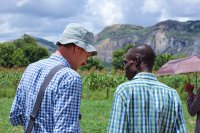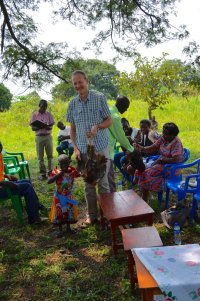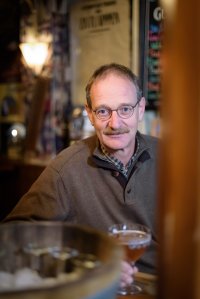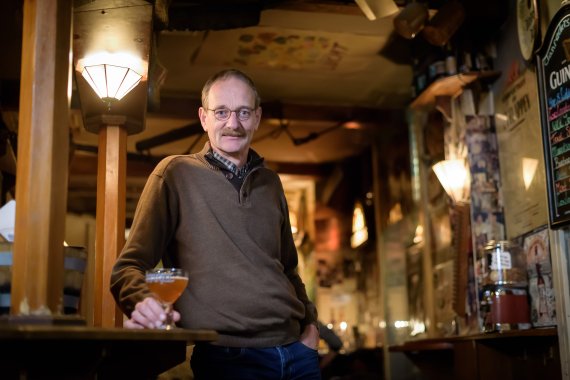© Guy Ackermans en chairgroup Plant Production Systems
Chance and beer both played a role in Ken Giller’s appointment as professor in Wageningen 17 years ago. ‘I was having a beer with Eric Smaling (then professor of Soil Science in Wageningen, ed.) in a café in Cotonou, in Benin. I was there for a conference. We had a lot of fun and he said: why don’t you come to Wageningen? There was a vacancy for a professor of Plant Production Systems. I had no idea what the job entailed, but I sent off my CV. I got a reply from Johan Bouma, chair of the advisory appointment committee, saying “sorry, the closing date was three weeks ago.” But apparently they couldn’t find a good candidate, because he got in touch again three weeks later.’
Excellent
Giller was professor of Soil Science at the University of Zimbabwe at the time, but he had to leave. The Mugabe government did not extend the contracts of any of the professors from Nigeria, Kenya or the UK. ‘So I’m an economic refugee’, he says ironically. Giller still held a personal chair at Wye College, University of London, but he didn’t want to go back to the UK. ‘Things were going badly for Wye College and it closed a few years later, partly because the British government no longer wanted to invest in agricultural research.’ Instead he opted for Wageningen.
In the intervening years, Giller has established a highly successful group. And he is one of Wageningen’s most frequently cited professors. His group was pronounced ‘excellent’ by international review committees in both 2009 and 2015. He is regularly invited as the keynote speaker at conferences on a wide range of topics: food security, nitrogen fixation, agriculture, climate change and soil fertility.

As a result, Giller spends a lot of time abroad. In recent weeks he has been to Brussels to support a research programme on photosynthesis, to Seattle to update the Gates Foundation on his large-scale multimillion-dollar N2Africa project, to Nigeria for another project, and to Cape Town to speak at the Global Food Security Conference.
Now that the British government wants to invest in agricultural research again, Giller gets offered professorships in the UK. ‘I’ve had the option of setting up a group at several universities.’ But he is staying in Wageningen. ‘There is much more breadth of knowledge in Wageningen than at British universities. And I need that broad expertise. Our chair group studies farmers and farms. That is a clear example of a research field with social, economic, agricultural, ecological and cultural dimensions. If I have an animal sciences question, I ask Imke de Boer; for human nutrition I go to Inge Brouwer. If I have an economics-related issue, I talk to Erwin Bulte. For political questions I call Peter Oosterveer, for research involving big data, Sander Janssen, and for sociology, Jens Andersson, Conny Almekinders and Cees Leeuwis. I’ve got so many collaborative projects here, with all the science groups. That is a tremendous advantage of Wageningen.’
At the moment, for instance, Giller is very enthusiastic about the collaboration with Wageningen historian Frans Huijzendveld. He is doing research in northern Tanzania, in a hilly region where Giller once did his first research project as a postdoc. ‘In this area the farmers had, and still have, problems with soil erosion and declining soil fertility. Researchers have documented this since 1890, and the problems haven’t changed. The point is: the farmers there don’t invest in measures to tackle the erosion and land degradation on the slopes. They prefer to invest in irrigation for vegetable farming in the valley, and to spend the money they earn on educating their children. If you concentrate on the patch of vegetables and maize, all you see is poor harvests. We need to understand the farmers’ aspirations. Those are decisive for whether and how they invest in agriculture.’
I am naïve enough to think we can improve African agriculture
Decent future
Giller is enormously driven to improve the position of African farmers, but it is not easy. ‘I’ve been working in Africa for 30 years now. The population has doubled in that time. The available land can barely feed the population, and now we expect numbers to double again within 20 years. How can we make sure there is enough land left for nature, while at the same time providing young people with a decent future? That sometimes keeps me awake at night. Really, African governments need to invest in jobs in the cities, so that rural youth can get out of agriculture. Because now all the children get a small patch of land, so farms get smaller and smaller, and more and more marginal.’
How do you turn that situation around to create sustainable agricultural development? ‘I am still naïve enough to think we can improve agriculture in these countries. But I can’t do that on my own and that is why I am happy with the collaboration we have in Wageningen. Another thing that helps is that I have now supervised 75 PhD students. Many of them are now in key positions in research organizations in Africa. Those alumni are probably the most important multipliers of our efforts.’
Nitrogen-fixers
But Giller has another important iron in the fire. Since 2009, he has led the project N2Africa, funded to the tune of 50 million dollars by the Bill & Melinda Gates Foundation. This project introduced small-scale farmers in Africa to nitrogen-fixing crops such as soya and other legumes. In its first phase the project reached as many as 230,000 small farmers in 11 African countries. They were given seeds of nitrogen-fixing crops, artificial fertilizer, and inoculants of the Rhizobium bacteria which fix nitrogen from the air in symbiosis with the crops. Next year, when the funding ends, the project hopes to have reached 750,000 African farmers.
For Giller, N2Africa is both an agricultural and a research project. He wants to achieve something with his research – ‘science for impact’ – and he sees farming practices as the driver of his research. ‘We have introduced the technology in 11 African countries. Now we are learning how we can improve the technology, so the crops have a good harvest, the soil fertility improves, and diseases and pests are controlled using crop rotation.’
In this work Professor Giller encounters more institutional hindrances than plant-related problems. ‘We work with different companies that supply the seed for the legumes, the inoculants, and the fertilizer. If one of these companies lets us down or supplies substandard goods, we have a problem.’ The other institutional problem is the market. ‘In northern Ghana, for example, we have stimulated the production of soya beans with this project. That went very well but then the price of soya went down and the farmers didn’t have a good market anymore. In that kind of situation you need a market mechanism or a government that guarantees a minimum price.’

Cacao farming
A crucial point, says Giller, is that he researches both the technical and the socio-economic aspects of food production. ‘That makes my group unique in the world. Most international colleagues focus on cropping systems, while we look at farming systems, and therefore at integration. We have to understand all aspects of the farming system. It is all about the research context: that is what decides whether your technology gets turned into an innovation. You could compare it with that toy with which children have to put round and square blocks into a box. If your technology is a round block that you’re trying to push through a square hole, it’s not going to work.’
Giller hopes there will be a follow-up to N2Africa, but he is also launching a new programme this year, called CocoaSoils. This is an 11-million-dollar project aiming at raising yields in cocoa farming by improving soil fertility. ‘We are going to work with local research institutes and international cocoa and artificial fertilizer companies to conduct field trials with the aim of increasing soil fertility in cocoa farming in Ecuador, Brazil, Côte d’Ivoire, Cameroon, Ghana, Nigeria and Indonesia. The aim is sustainable intensification of cocoa farming, because the demand for chocolate is expected to double in the coming years. Here again, we are going to look at management and best practices.’
I’ll always be British. I love cricket and English pubs
It has to be fun!
Giller dislikes management work, say his colleagues. He himself says he wants to make the best use of his precious time in the office. ‘I can’t stand filling in forms, administration and Excel sheets, but I do invest in personnel management. Discussions with staff matter a lot to me. What is important is that I acknowledge and respect their input into our activities. I spend the time I have in Wageningen on project consultations with colleagues, supervising PhD candidates, and teaching. The main thing is to enjoy your work. I spend so much time on my job: it has to be fun! A pleasant atmosphere is important, and you need to be able to trust each other completely, because that is the only way you can really share information and discuss your research properly. ‘This year I’ve been to Africa 10 times. I get inspiration in the field, and pick up new research questions. I often have to go to workshops in capital cities, but I prefer to be in villages, close to the action.’
Pool en darts
He speaks Dutch fluently but if the subject gets complex or he needs to be precise, Professor Giller sometimes switches to English for a moment. He has been living in Wageningen for 17 years, but spends much of his time in Africa. So does he feel British, Dutch or African? ‘I’ll always be British. I love cricket and English pubs. Once, when I was in Johannesburg for a workshop with Wageningen colleagues, I played pool and darts again – and won hands down. I played in a darts team at university in England. My wife is Dutch; I met her in England. When we lived in England I spoke Dutch with the children, so I learned the language at home.’
His command of Dutch is very useful in Wageningen. ‘It is essential to speak Dutch at this university. People in Wageningen want to speak their own language, especially if things get complicated or emotional. Besides, you pick up more of what is going on if you speak Dutch. It’s always a matter of context, whether you are doing research or leading a research group.
Zimbabwe
But Giller’s future may not lie in Wageningen. His heart is in Zimbabwe. ‘I would love to go back to build up the agriculture faculty at the University of Zimbabwe again. I only worked there full-time for three years, but I still work with researchers there. Now that Mugabe has stepped down as president, the possibility of going back has become more realistic. But I will only go if there is a genuine regime change, if the current government is completely gone.’
Zimbabwe had a rich academic culture, says Giller. ‘In the 1990s it had the best university in Africa in the field of small-scale farming, but the country has suffered a massive brain drain to South Africa, the UK and the US over the past 18 years. The Zimbabwean people deserve better than that, and I would love to contribute to restoring the University of Zimbabwe to its former glory. Besides, it is a beautiful country where you can go camping in the bush surrounded by wild animals. I love going there!’

Ken Giller is senior fellow at the UNEP World Conservation Monitoring Centre in Cambridge and a member of Unilever’s Sustainable Sourcing Advisory Board. He is married with two children.
| Ken Giller | 2001 | Professor of Plant Production Systems, Wageningen University & Research |
|---|---|---|
| 1998 | Professor of Soil Science, University of Zimbabwe | |
| 1996 | Personal professor in Tropical Soil Fertility at Wye College | |
| 1986 | Lecturer in Tropical Soil Science, at Wye College, University of London | |
| 1982-1986 | Researcher at Rothamsted Experimental Station, working at ICRISAT in India and CIAT in Colombia | |
| 1978-1982 | PhD in Plant Ecology, Sheffield University | |
| 1975-1978 | BSc in Botany, Sheffield University | |
| 1956 | Born in Blaby, near Leicester, UK |

